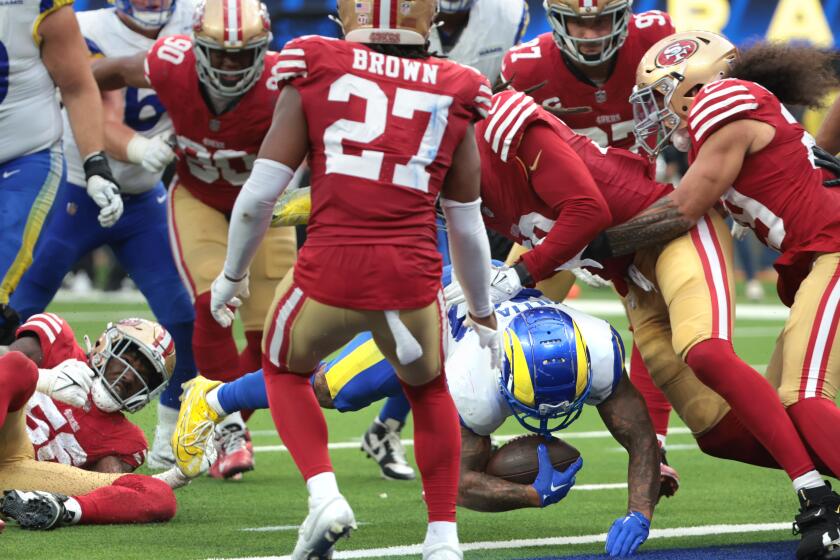The Great Steroids Debate: A juicer nanny state?
All week long, Mat “Halos Heaven” Gleason and New York Sun baseball writer Tim Marchman have been debating steroids in baseball. Monday’s installment probed the options for Angels owner Arte Moreno in disciplining suspected Human Growth Hormone orderer Gary Matthews, Jr; Tuesday chewed on how steroids have changed baseball, Wednesday dealt both with Matthews’ statement of innocence and the ideal punishment for diamond drug-users, and yesterday pondered whether the word “witch hunt” can apply. Today’s topic: Will the steroids hunt spill over and affect the rights of ordinary citizens?
Don’t fear government blowhards
By Mat Gleason
Tim,
The hysteria around privacy issues and drug testing is overblown. For years we were told there was no smoke, proof there was no fire. Jose Canseco changed that. His former teammate Mark McGwire fell from the pinnacle of prestige to perennial pariah in record time. What were they hiding? Lots. Why were they hiding it? There is a culture that protects superstars -- and some of the guys racking up big numbers were juicing, no doubt about it.
But the real reason they did was because they could. Sheer arrogance. A refusal to be subject to standard scrutiny that many employers demand and that many employees agree to. Of course, management is at fault as well, as they never pursued steroid testing too seriously, primarily because chasing the juicers had no financial reward.
But the inanity of the congressional hearings at which McGwire’s reputation perished should give every American citizen peace of mind regarding the issue of the government invading one’s private lives. The blowhards couldn’t keep an interesting secret for five minutes if it meant not getting on CNN. There was no interest in anything besides achieving a superficial demagoguery.
Our privacy was never the issue. Baseball’s anti-trust exemption was the issue. Congress just cannot stand the fact that there is a cartel they cannot control. They do not embarrass the NFL. They do not assume Kobe’s cheapshots are ‘roid rage. But baseball can do what it wants unilaterally and Congress lives to poke and prod as a stern reminder that ... darn it, Henry Waxman is TOO a powerful somebody.
The threat of examining the anti-trust exemption pushed the owners into action, so at least some good came out of the congressional monomania. It would be disingenuous to say that I completely abhorred the congressional hearings. The union was finally forced to face the fact that a sea change in public opinion had occurred, and it sure was fun watching Don Fehr twist in the wind, clinging in vain to the denial that privacy issues were a sacrosanct cradle-to-grave guarantee -- an argument that had served him so well since the great Pittsburgh cocaine scandal became public in the 1980s.
The hypocrisy of the players being above the game has been the greatest shame in this mess. The union representation protected the interests of a few juicers at the expense of the integrity of what it means to be a player. Every great accomplishment by a player in this generation will be seen in a suspicious light. All in the name of a superiority complex masquerading as a privacy rights crusade. Way to help the brotherhood, Mister Fehr.
Mat Gleason is the publisher of Coagula Art Journal. As “RevHalofan” he blogs daily about the Angels at Halos Heaven.
It’s always labor that bends to guvmint hysteria
By Tim Marchman
Mat,
As at many points in our debate, we’re agreed on an important point here, which is that congressional hearings into steroid use are ridiculous. I admire the publicity-seeking Rep. Waxman -- he’s one of the few congressmen who seems to actually care that the government is operating an unaccountable private army the size of our public one in Iraq -- but he really has better things to do with his time than talk to meatheads like Mark McGwire.
On two equally important points, though, we’re in firm disagreement. The first is that because many employers demand their workers urinate in cups, the Major League Baseball Players Association ought not to raise privacy issues when negotiating drug testing policies. The truth is that, with a few obvious exceptions involving things like the operation of heavy machinery, the only reason anyone gets tested for drugs is that they’re too weak and powerless to do anything about it.
Drug testing very rarely serves the interests of anything other than exerting dominance over the worker and reducing his humanity. The players agreed to testing not because they were weak and powerless, but because a majority of them wanted either a clean game, and an end to the bad PR the game was getting, or both. That doesn’t mean their union was under an obligation to agree to any dumb scheme any congressman or baseball executive cooked up. Congress was seriously threatening to test ballplayers for substances you can buy over the counter. In such an environment, it’s anything but posturing to talk about privacy and equal protection under the law.
The second is that baseball’s anti-trust exemption was in play here. For a column I wrote last week, I did a bit of checking into baseball’s political contributions. While the game enjoys a mild, nonpartisan reputation, the truth is that baseball owners targeted the most important elections last year, the ones on which control of Congress turned, and pumped money into Republican campaigns, ranking among the most important donors to Sen. Jon Kyl and Sen. Mike DeWine, among others. (The game’s contributions to DeWine are particularly interesting, as MLB and a lobbying firm whose top client is baseball ranked between them as DeWine’s third-biggest supporter.)
All the biggest blowhards and grandstanders on steroids in Congress --Sen. John McCain, Rep. Tom Davis, and DeWine (who once convened hearings on competitive balance) -- received plenty of baseball cash. And when you look back at the effects of all their blowing hard and standing grand, it’s always been the union that satisfied them. On whatever the issue before the government, the owners, who make big donations, get tongue-lashings from our decrepit elected officials, while the union gets pressured to agree to drug testing or to not exercise their right to strike because (really!) we are living in a post-9/11 world.
To understand baseball’s relationship with Capitol Hill, you have to understand that it’s a kabuki show, where congressmen preen for the cameras, owners accept ritual shaming, and players underwrite the accumulation of political capital. There are far, far more important kabuki shows to get upset about, but if we’re concerned with baseball at all we have to reject cynicism and equivocation and just say, flat out, that the players are entirely right and the bigwig owners and political hacks entirely wrong. The issue isn’t Jose Canseco, it’s whether labor can continually be subjugated to the interests of capital for the political benefit of corrupt windbags who are more interested in Barry Bonds’ hat size than they are in the modern Hessian. There can be no compromise with such wickedness.
Tim Marchman writes about baseball for the New York Sun. He finds all senators intensely creepy, even the ones whose policy views he finds admirable, save for Sen. Ron Wyden, for whose wife he used to work.
More to Read
Go beyond the scoreboard
Get the latest on L.A.'s teams in the daily Sports Report newsletter.
You may occasionally receive promotional content from the Los Angeles Times.










